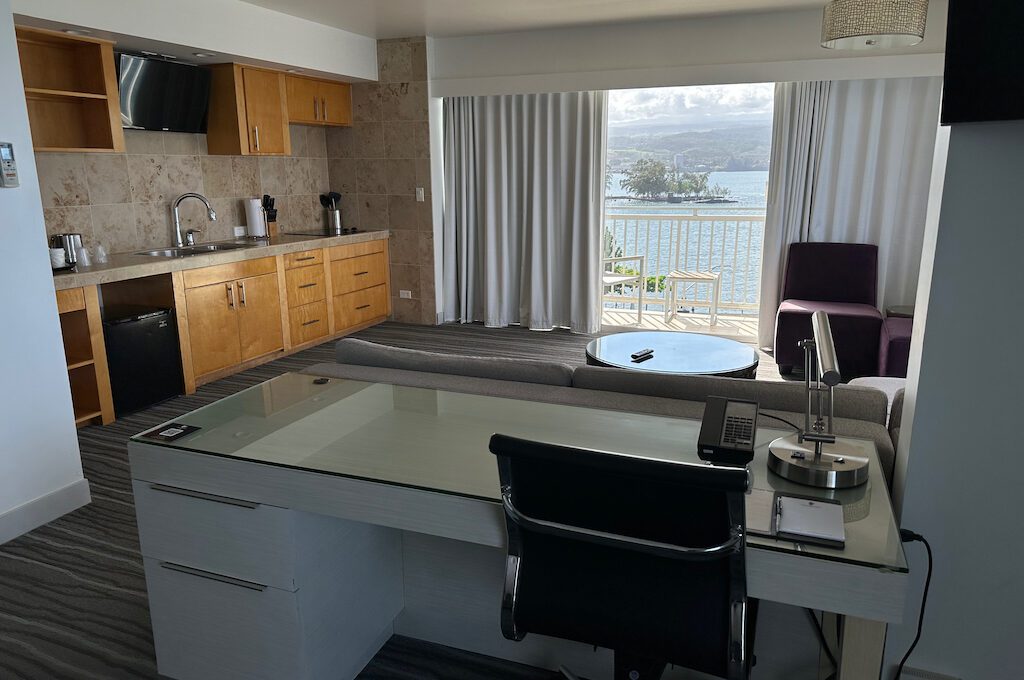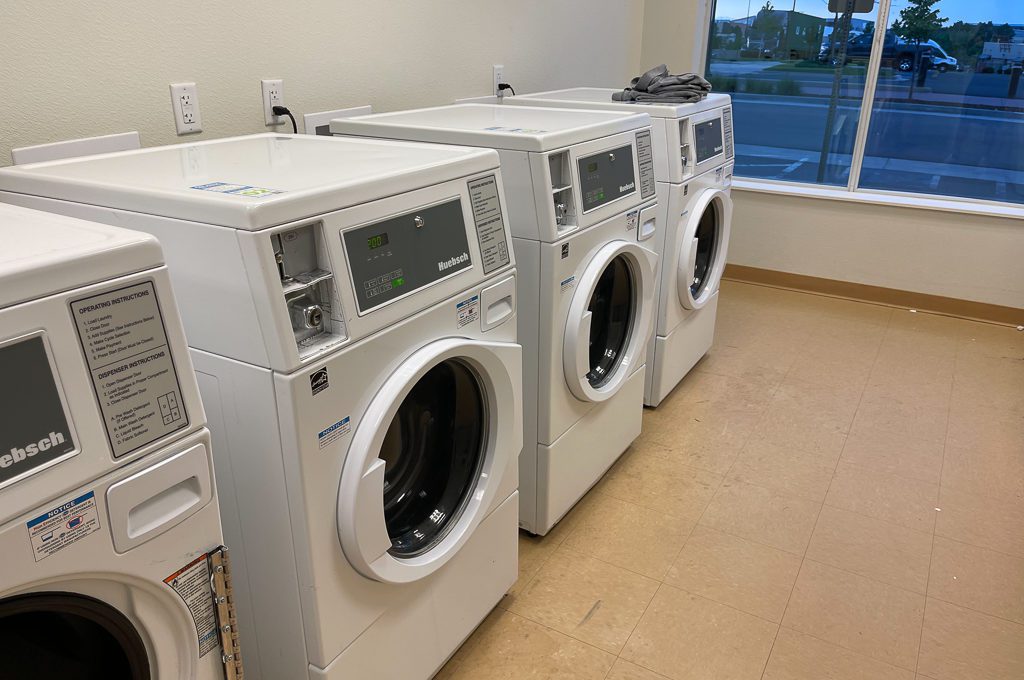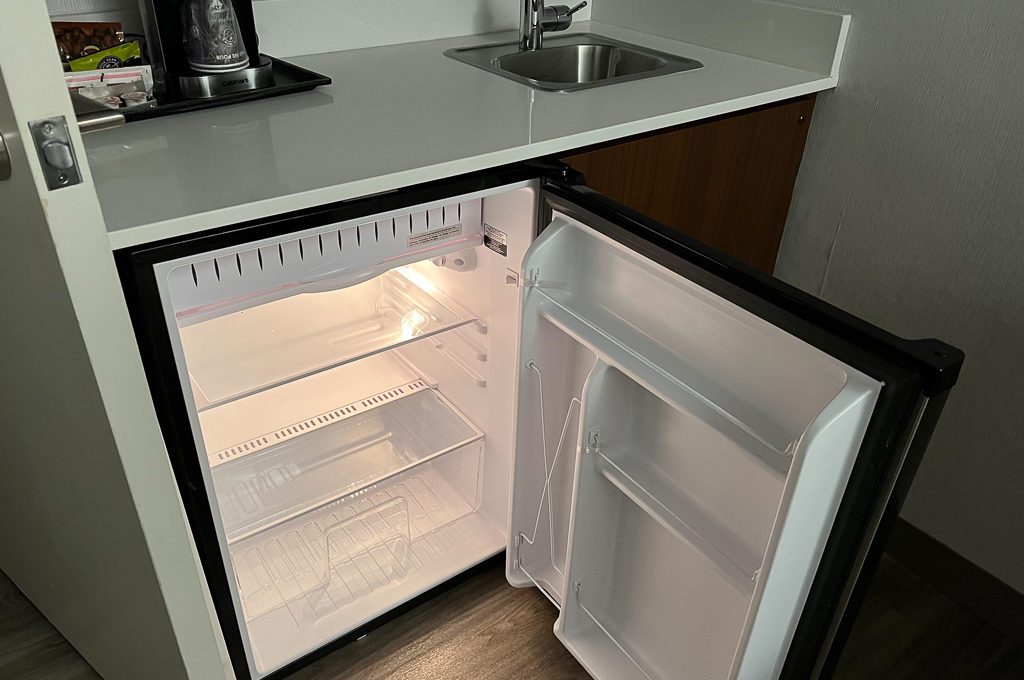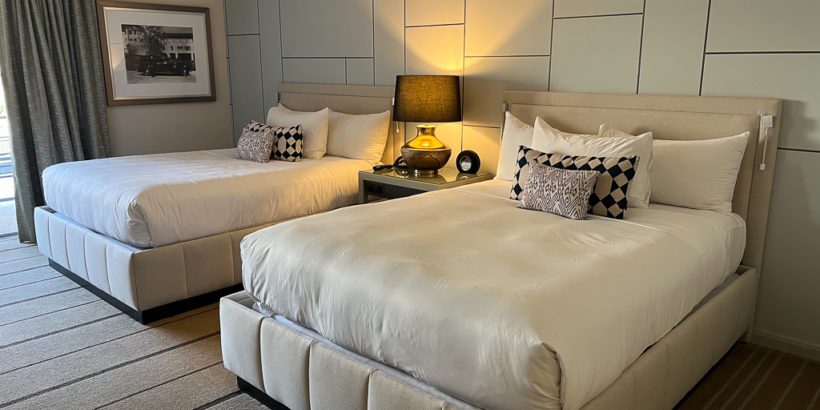This is sort of Part II of my blog post: Can You Live in a Hotel? Or Better Yet, Should You?
At that time, I’d thought about living abroad in hotels but eventually decided not to go that route for various reasons.
But years later, I made the jump and decided to live full time in hotels/AirBnbs (but in the US)!
Allow me to now share with you a few valuable insights and lessons that I have acquired along the way.
Table of Contents
Organization is key
Staying organized in a hotel room is of paramount importance, especially for individuals planning to live in a hotel and who may have more baggage and belongings compared to the average traveler.
With all the extra items, it becomes easier to misplace or lose important belongings amidst the confined space and constant rotation of luggage.
So what can you do?
First, you need to avoid bringing too many things with you.
We did a pretty good job of getting rid of our stuff but we still did bring some things that we just didn’t have to have like a ramp for our dog, extra bed cushions, etc.
But don’t stress too much about getting this right.
You can trim down your belongings all you want but you probably won’t be able to get it completely right until after you’ve been living in a hotel for a couple of weeks. Only then will you see what you truly need or don’t need.
You also need to implement some organizational strategy.
One thing that I do is I have designated places for valuables. If I’m ever looking for a wallet, keys, key card, etc. I know it’s gonna be on the corner of a table or a piece of furniture. My hat and sunglasses will always be on the dresser, by the TV.
I have a designated luggage bag for all of my electronics including my camera, drone, batteries, charging cables, etc. I also have another bag for things like medications, toiletries, etc.
I also always know what I keep in each compartment of my backpack, so I’m not left guessing as to where things are.
By implementing effective organizational strategies, one can maintain order and minimize the risk of misplacement or damage.

Be aware of local ordinances
Lots of people know that if you book a longer-term stay you can save money by taking advantage of the extended stay rates. Sometimes the savings can be very significant, too!
But what a lot of people don’t know is that certain cities may have ordinances that restrict extended stays in hotel properties for longer than a month.
Unfortunately, hotels may not always disclose this information at the time of booking, allowing guests to proceed with their reservations unknowingly.
It won’t be until later on when the hotel does an audit that they pick up on this and then request for you to terminate part of your booking — something that can obviously be a huge inconvenience.
Therefore, it becomes essential for long-term residents to conduct thorough research about local regulations and clarify any potential limitations directly with the hotel before finalizing their stay.
Pick the right property
Often, you will be drawn to extended-stay properties that are specifically designed for people to stay long stays, including longer than a month.
These are great because they often have kitchenettes or kitchens, laundry facilities, a gym, pool, and are relatively easy to get in and out of.
But sometimes they do have their drawbacks.
You could be dealing with a single, slow elevator, less than tidy properties, thin floors and walls, lower points earning (such as with Marriott), and areas more removed from the heart of a city (though not always). They also could be more expensive than a traditional hotel, although that really varies.
A traditional hotel can offer you cheaper rates, better locations, more dining options, and a greater selection of room types. They also may be located in high-rise buildings with better views, better soundproof walls and windows, more aesthetically pleasing designs, bigger staff, etc.
The drawback is that it may be harder to find rooms with a kitchen, you may have to pay more for parking, and if you’re saving money on the room rate, chances are you’re in a pretty small room.
In the end, it may take some experimentation for you to get a feel of the type of hotel you prefer living in. Be open to trying different room types.
Personally, I prefer a smaller, quieter hotel in less populated areas with nice open spaces but with a diverse selection of restaurants and stores within reach. Areas like the Denver Tech Center fit this description perfectly.

Verify the hotel’s details
Once you settle on a property, make efforts to verify hotel details before booking.
While hotel websites may showcase various amenities and facilities, it is crucial to conduct thorough research and confirm the accuracy of the information provided.
Often, discrepancies arise where certain facilities or services mentioned on the website might not actually exist or may be temporarily unavailable due to renovations or other reasons.
We actually ran into this at one of the first hotels we stayed at.
They advertised that they had laundry facilities but when we arrived we were notified that they no longer had them which means we would have to find a local laundromat which was a pretty major inconvenience.
By taking the time to verify hotel details through multiple sources, such as contacting the hotel directly or reading reviews from past guests, individuals can avoid potential disappointments upon arrival.
Verify things like:
- Safety and security measures (e.g., security cameras, well-lit parking areas)
- Availability of 24-hour front desk or concierge service
- Room amenities (e.g., Wi-Fi, air conditioning, heating)
- Accessibility features (e.g., wheelchair ramps, elevators)
- Availability of laundry facilities or services
- On-site dining options (e.g., restaurant, lounges, breakfast service)
- Fitness center or gym facilities
- Swimming pool or spa
- Parking options (availability, cost, valet service)
- Pet-friendly policy (if applicable)
- Business center or meeting rooms
- Shuttle service or proximity to public transportation
- In-room amenities (e.g., mini fridge, microwave, safe)
- Housekeeping frequency and policies
- Additional charges or resort fees
- Children’s facilities or activities (if applicable)
This proactive approach ensures that one’s expectations align with the reality of the hotel, allowing for a more enjoyable and hassle-free long-term stay experience.
Related: Laundry At Hotels? Essential Tips for Keeping Your Threads Fresh

Transplant + modify your routines
When choosing to live in a hotel full-time, it becomes crucial to transplant and modify your most precious routines to adapt to the new environment.
Some of your routines may need to be modified to fit the hotel’s setting.
For example, before moving into a hotel I had the same breakfast smoothie probably 355 days a year every morning at 6 AM.
But using a loud blender at 6 AM in a hotel room may disturb others who are still sleeping or trying to relax. To address this concern, I adjusted my routine by preparing my smoothie during lunch (which also allowed me to take advantage of a free breakfast).
It’s essential to maintain other “centering” routines as well, such as working out, going for walks, or meditating, as they contribute to a sense of normalcy and help you settle into your new lifestyle more comfortably.
By modifying and transplanting your routines, you can create a semblance of familiarity and establish a sense of stability in your hotel living experience.

Study your nearby area/neighborhood before booking
Picking the right hotel property is crucial for individuals planning to live in a hotel as it sets the foundation for a comfortable and convenient long-term stay.
There are several factors to consider when selecting the ideal hotel.
First and foremost, being familiar with the crime levels of the surrounding area is essential for ensuring personal safety and peace of mind.
When living in a hotel room for extended periods of time, you’re going to want to get outside to get fresh air, exercise, etc. And you don’t want to be constantly looking over your shoulder or worrying about people breaking into your car.
While you can figure out some details (like whether or not there are sidewalks) by utilizing satellite images and Google Street view, sometimes you also just need to call the front desk and try to get the inside scoop.
I once called a hotel to inquire about the safety of the area, and after a long and awkward pause, the front desk agent’s equivocating response didn’t exactly leave me feeling reassured.
Despite liking the property and what it had to offer, the uncertainty surrounding its safety made me decide against staying there.
It’s important to prioritize your own peace of mind and security when choosing accommodations, and if a hotel’s response leaves you uncomfortable or uncertain, it’s always better to err on the side of caution and explore other options that align with your safety concerns.

Take control of your environment
When staying in a hotel, it’s often unpredictable whether you’ll encounter noise issues or unwanted street light entering through the windows.
To take control of your environment and ensure a peaceful stay, it’s imperative to come prepared.
Consider packing essentials such as eye shades to block out any intrusive light and earplugs or noise-canceling headphones to counteract potential disturbances from neighboring rooms or noisy surroundings.
I’d also highly recommend bringing your own blanket and potentially your own pillow so that you can always have a baseline level of comfort in your bed. (Some hotels just don’t wash their bedding.)
By proactively equipping yourself with these items, you can mitigate any unforeseen disruptions and create a more serene and comfortable atmosphere for yourself, regardless of the hotel’s environment or the behavior of fellow guests.
It’s also good to familiarize yourself with the quiet hours of a property so that you’ll know when you need to voice a complaint.
Related: Can You Get Kicked Out of a Hotel?
Make requests if needed
When living in a hotel, it’s important not to be afraid to make special requests. Hotels are often willing to accommodate guests’ needs and preferences to ensure a comfortable and enjoyable stay.
Whether it’s requesting additional amenities like a microwave or a mini fridge in your room, or even something as specific as chargers for your electronic devices, it’s worth asking the hotel staff for assistance.
Here are some requests you might make:
- Extra towels or pillows
- Toiletries or personal care items
- Iron and ironing board
- Microwave or mini-fridge
- Electric kettle or coffee maker
- Extra hangers or storage space
- Yoga mat or exercise equipment
- Adapter or charger for electronic devices
- Room service menu or restaurant recommendations
- Portable fan or heater (depending on the season)
- Wake-up call service
- Umbrella
- First aid kit
- Stain remover or laundry detergent
- Late check-out or early check-in (subject to availability)
- Assistance with luggage storage or handling
- Access to fitness center or pool
- Assistance with arranging dry cleaning or laundry services
- Assistance with finding local attractions or events.
Many hotels are equipped to fulfill such requests or may have alternative solutions available.
Being proactive in communicating your needs can enhance your living experience and make your temporary residence feel more like home. Don’t hesitate to reach out to the hotel’s front desk or concierge and make your special requests known.

Leverage hotel breakfast benefits for savings
Picking a hotel that offers free breakfast can be a smart choice for individuals planning an extended stay, as it can result in significant cost savings on a daily basis.
Having breakfast included in your hotel stay eliminates the need to spend money on dining out every morning, allowing you to allocate those funds for other expenses or activities.
However, eating the same hotel breakfast every day might lead to some monotony or boredom over time. To mitigate this, some hotels offer variety in their breakfast options, but even then, there’s only so much variety you’ll be offered in the long-run.
Sometimes you’ll need to get creative with how you fix up your breakfast. For example, you can whip up a savory breakfast sandwich by toasting the bread, topping it with a perfectly cooked egg and a dollop of salsa for a burst of flavor.
Breakfast is also one of the most easily quantifiable savings you can calculate we’re living in a hotel. For example, you might typically spend seven dollars a day on breakfast during the week and $12 during the weekend. It’s really easy to calculate your savings and factor those into the cost of your room.
Certain hotels may provide free breakfast in a restaurant setting, which may require tipping the server.
While this can slightly reduce the overall savings, the convenience and time saved by having a prepared breakfast readily available can still outweigh the additional expense, at least for those who are okay with tipping.
Overall, selecting a hotel with a complimentary breakfast can be a practical choice that helps stretch your budget while providing a convenient start to your day.

Create front desk BFFs
Making friends with the hotel front desk staff is of utmost importance for individuals planning to live in a hotel. Building a positive and friendly relationship with the front desk can prove invaluable in various ways.
They are the go-to people who can assist with a wide range of needs that may arise during a long-term stay. Whether it’s sending or receiving packages, they can ensure the smooth handling of your mail and deliveries.
Additionally, in case of any issues or complaints, such as problems with Wi-Fi, hot water, or other amenities, having a good rapport with the front desk staff can expedite the resolution process.
Here are some of the major ways they can help you out:
- Assist with room upgrades or changes if available
- Provide recommendations for local attractions, restaurants, and activities
- Help arrange transportation services or provide information on public transportation options
- Assist with booking reservations for dining, shows, or other events
- Facilitate mail and package handling, including receiving and holding packages on your behalf
- Help resolve any issues or complaints during your stay, such as noise disturbances or maintenance problems
- Quickly provide additional amenities or supplies upon request, such as extra towels or toiletries
- Offer insights on hotel policies, such as late check-out or early check-in options
- Assist with arranging special requests or surprises, such as celebrating a special occasion or organizing a surprise gift delivery
- Provide local maps, guides, and information on nearby attractions or services.
Their knowledge and expertise can help swiftly address and rectify any concerns you may have, ensuring a more comfortable and enjoyable living experience.
By fostering a friendly relationship with the hotel front desk, you gain a reliable resource and ally who can provide assistance and support throughout your stay.

Mandatory housekeeping is not always so mandatory
While some hotels may claim that mandatory housekeeping is required at least once every five or seven days during an extended stay, it’s important to note that this policy may not always be strictly enforced.
Many hotels understand that guests may prefer to maintain their privacy and choose to decline daily housekeeping services.
However, it’s still advisable to keep your room in good condition throughout your stay.
By tidying up regularly, you can ensure that your living space remains comfortable and presentable, and prevent a buildup of clutter or mess.
Taking responsibility for the cleanliness of your room also means that when the time comes for a housekeeping agent to attend to your room at the end of your stay, they won’t be confronted with a daunting and overwhelming task.
Two tips I have for keeping your room in better condition:
- Put your trash in a tightly wrapped bag and place it outside the door for housekeeping to pick up or throw it away in a bin located in the hallway/outside an exit
- Ball up your towels and place them outside your door for housekeeping to pick up; request new towels via phone or from a housekeeper in the hallway
Related: Don’t Want to Use Hotel Housekeeping? Here’s What to Do

Final word
In conclusion, living in a hotel can be a great option for individuals who are looking for a temporary or long-term living arrangement.
However, there are a few things to keep in mind to ensure a comfortable and enjoyable stay. By following these tips, you can make the most of your hotel living experience.
Here are some of the key points to remember:
- Do your research. Before you book your stay, be sure to research the hotel and the surrounding area to make sure it is a good fit for your needs.
- Be organized. When living in a hotel room, it is important to be organized to avoid clutter and make the most of your space.
- Pick the right property. Consider the size of the room, the amenities offered, and the location of the hotel when making your decision.
- Verify details. Make sure the hotel’s website accurately reflects the amenities and services offered.
- Study your nearby area. Be aware of the crime levels, sidewalks, and parking options in the area.
- Make requests. Don’t be afraid to ask the hotel staff for special requests, such as additional amenities or chargers for your electronic devices.
- Take advantage of free breakfast. Many hotels offer free breakfast, which can save you money on dining out.
- Make friends with the front desk staff. They can be a valuable resource for assistance and support throughout your stay.
- Keep your room clean. Even if housekeeping is not required, it is still considerate to keep your room clean for the next guest.
By following these tips, you can make the most of your hotel living experience and enjoy a comfortable and convenient stay.
Daniel Gillaspia is the Founder of UponArriving.com and the credit card app, WalletFlo. He is a former attorney turned travel expert covering destinations along with TSA, airline, and hotel policies. Since 2014, his content has been featured in publications such as National Geographic, Smithsonian Magazine, and CNBC. Read my bio.

